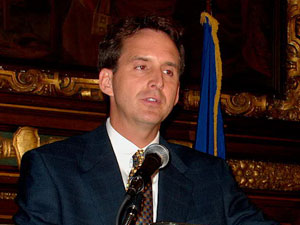|
Audio
Photos
Your Voice
|
DFLers call for hearings into Pawlenty's ties to phone company
July 14, 2003
 |
| Gov. Tim Pawlenty says he wasn't involved in the day-to-day operations of New Access, a telephone company, and was not aware of consumer complaints filed against the firm. (MPR Photo/Michael Khoo) |
St. Paul, Minn. — New Access was formed in the spring of 2000 to take advantage of federal deregulation of the telephone industry. The company's business plan involves buying telephone access, repackaging it, and selling it to consumers more cheaply than traditional providers can. But within a year, the company was the subject of complaints that it had switched some consumer's telephone service without permission -- a process known as slamming.
Gov. Pawlenty had no direct role in New Access, but he did serve as a board member of the parent company, NewTel, from 2000 to 2001. He says he was unaware of the numerous complaints.
 | |||
"The basic facts are there were some consumer complaints against a company that I was not on the board of, didn't have a management role in, and did not oversee the day-to-day operations of," Pawlenty says. "And so therefore I'm to blame for their marketing approaches. And I guess if that's the conclusion, that's frustrating to me because I wasn't aware of the problem."
Pawlenty left the board of NewTel one year after it acquired New Access. Last year, the company settled cases in three states for $222,000. Just before taking office as governor, Pawlenty sold his interest in the company for $10,000.
But Senate Democrats say the story -- first reported in the St. Paul Pioneer Press -- raises troubling questions. Ellen Anderson of St. Paul chairs the Commerce and Utilities commission. She says it's disturbing to think the state officials charged with protecting consumers and regulating industry may have profited from their own abuses.
"The list of explanations and excuses we've heard really just don't cut it," Anderson says. "They're not detailed. They don't give a real answer. They don't resolve the conflicting kinds of information we're getting in these articles."
Anderson also questions the number of Republican activists with ties to the administration and the web of telecommunication companies in question. Among them are State Auditor Patricia Awada, party activist Elam Baer, and commerce department official Tim Commers.
New Access co-founder Steven Clay says it's not unusual for acquaintances to do business together. And he says it's unreasonable to believe the company intended to defraud anyone.
Clay says New Access loses money when customers are switched without permission and must therefore be switched back. Clay also says, despite the company's connections to state officials, there's no indication those connections have been exploited.
"Something that's very conspicuous by its absence is any sort of indication that this confluence of people has resulted in any kind of regulatory decision, or policy or something like that, that's in any way favorable to New Access," Clay says.
In fact, Clay says, the company is cooperating in an investigation led by Minnesota Attorney General Mike Hatch. A spokeswoman for Hatch declined to comment on the matter. Clay says the company expanded rapidly and suffered some growing pains -- but he says complaints have since fallen off and that no major investigation or regulatory action has been commenced in more than a year.
Clay also says it's not unusual for firms that use telemarketing to draw criticisms. But University of Minnesota professor Norman Bowie says that shouldn't be an excuse for not having adequate consumer safeguards.
Bowie, who specializes in business ethics, says the deregulated telephone industry was notorious for slamming complaints in the early '90s. He says they were common enough that Pawlenty should have taken a more active interest in his subsidiary's behavior.
"The expectations weren't as high as they are now. And this standard has gradually expanded in practice over the past three or four years. But legally, and to some extent morally, that's always been there -- that you're responsible," says Bowie.
Bowie says before the collapse of Enron, many boards were reluctant to take an intensive interest in the management of their subsidiaries.
|
News Headlines
|
Related Subjects
|
